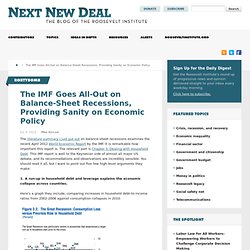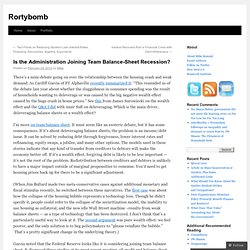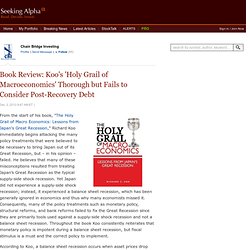

The IMF Goes All-Out on Balance-Sheet Recessions, Providing Sanity on Economic Policy. The literature summary I just put out on balance-sheet recessions examines the recent April 2012 World Economic Report by the IMF.

It is remarkable how important this report is. The relevant part is Chapter 3, Dealing with Household Debt. This IMF report is well to the Keynesian side of almost all major US debate, and its recommedations and observations are incredibly sensible. You should read it all, but I want to point out five few high-level arguments they make: 1. Here's a graph they include, comparing increases in household debt-to-income ratios from 2002-2006 against consumption collapses in 2010.
Implicit here is that the problems aren't labor "inflexiblity" or whatever the latest faddish argument is. You see the same exact relationship across the states in the United States, where the biggest increases in household leverage ratios (i.e. the places with the biggest housing collapses) have the worst unemployment and consumption collapses. 2.
III. IV. Couldn't put it better myself. The Age of Balance Sheet Recessions. Nomura's Koo Plays The Pre-Blame Game For The Pessimism Ahead. Is the Administration Joining Team Balance-Sheet Recession? There’s a mini-debate going on over the relationship between the housing crash and weak demand.

As Cardiff Garcia of FT Alphaville recently summarized it: “This reminded us of the debate last year about whether the sluggishness in consumer spending was the result of households wanting to deleverage or was caused by the big negative wealth effect caused by the huge crash in home prices.” See this from James Surowiecki on the wealth effect and the Q&A I did with Amir Sufi on deleveraging. Which is the main driver, deleveraging balance sheets or a wealth effect? I’m more on team balance sheet. It must seem like an esoteric debate, but it has some consequences. (When Jim Bullard made two meta-conservative cases against additional monetary and fiscal stimulus recently, he switched between these narratives.
Garcia noted that the Federal Reserve looks like it is considering joining team balance sheet. The White House also looks to be on team balance sheet. Like this: Like Loading... The Holy Grail of Macroeconomics: Lessons from Japans Great Recession - Richard C. Koo. The revised edition of this highly acclaimed work presents crucial lessons from Japan's recession that could aid the US and other economies as they struggle to recover from the current financial crisis.

This book is about Japan's 15-year long recession and how it affected current theoretical thinking about its causes and cures. It has a detailed explanation on what happened to Japan, but the discoveries made are so far-reaching that a large portion of economics literature will have to be modified to accommodate another half to the macroeconomic spectrum of possibilities that conventional theorists have overlooked. The author developed the idea of yin and yang business cycles where the conventional world of profit maximization is the yang and the world of balance sheet recession, where companies are minimizing debt, is the yin.
Book Review: Koo's 'Holy Grail of Macroeconomics' Thorough but Fails to Consider Post-Recovery Debt. From the start of his book, "The Holy Grail of Macro Economics: Lessons from Japan's Great Recession ," Richard Koo immediately begins attacking the many policy treatments that were believed to be necessary to bring Japan out of its Great Recession, but – in his opinion – failed.

He believes that many of these misconceptions resulted from treating Japan’s Great Recession as the typical supply-side shock recession. Yet Japan did not experience a supply-side shock recession; instead, it experienced a balance sheet recession, which has been generally ignored in economics and thus why many economists missed it. Consequently, many of the policy treatments such as monetary policy, structural reforms, and bank reforms failed to fix the Great Recession since they are primarily tools used against a supply-side shock recession and not a balance sheet recession. As a result, since the private sector is busy paying down debt, monetary policy is impotent. Follow Chain Bridge Investing (55 followers) Koo on German bubbles.